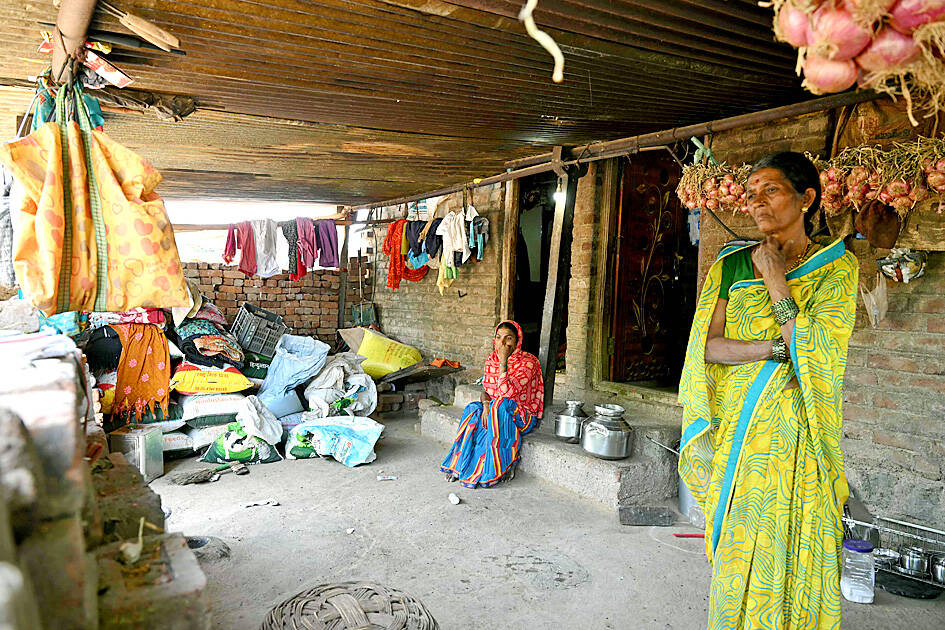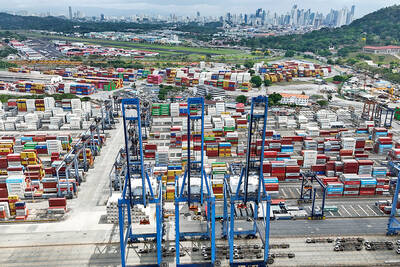On a small farm in India’s Maharashtra state, Mirabai Khindkar said the only thing that her land grew was debt, after crops failed in drought and her husband killed himself.
Farmer suicides have a long history in India, where many are one crop failure away from disaster, but extreme weather caused by climate change is adding fresh pressure.
Dwindling yields due to water shortages, floods, rising temperatures and erratic rainfall, coupled with crippling debt, have taken a heavy toll on a sector that employs 45 percent of India’s 1.4 billion people.

Photo: AFP
Mirabai Khindkar’s husband, Amol, was left with debts to loan sharks worth hundreds of times their farm’s annual income, after the one hectare soybean, millet and cotton plot withered in scorching heat.
He swallowed poison last year.
“When he was in the hospital, I prayed to all the gods to save him,” 30-year-old Mirabai said, her voice breaking.
Amol Khindkar died a week later, leaving behind Mirabai Khindkar and three children. Her last conversation with him was about debt.
Their personal tragedy is replicated daily across Marathwada, a region in Maharashtra of 18 million, once known for fertile farmland.
Extreme weather events across India last year affected 3.2 million hectares of cropland — an area bigger than Belgium — the New Delhi-based Centre for Science and Environment research group said.
More than 60 percent of that was in Maharashtra.
“Summers are extreme and even if we do what is necessary, the yield is not enough,” Amol Khindkar’s brother and fellow farmer Balaji Khindkar said. “There is not enough water to irrigate the fields. It doesn’t rain properly.”
Between 2022 and last year, 3,090 farmers took their own lives in Marathwada, an average of nearly three a day, Indian Minister of Agriculture and Farmers’ Welfare Shivraj Singh Chouhan said.
Government statistics do not specify what drove the farmers to kill themselves, but analysts point to several likely factors.
“Farmer suicides in India are a consequence of the crisis of incomes, investment and productivity that you have in agriculture,” said R. Ramakumar, professor of development studies at the Tata Institute of Social Sciences.
Farming across many Indian smallholdings is done largely as it has been for centuries and is highly dependent on the right weather at the correct time.
“What climate change and its vulnerabilities and variabilities have done is to increase the risks in farming,” Ramakumar said.
This “is leading to crop failures, uncertainties ... which is further weakening the economics of cultivation for small and marginal farmers,” he said.
The government could support farmers with better insurance schemes to cope with extreme weather events, as well as investments in agricultural research, he added.
“Agriculture should not be a gamble with the monsoon,” Ramakumar said.
Faced with uncertain weather, farmers often look to stem falling yields by investing in fertilizers or irrigation systems, but banks can be reluctant to offer credit to such uncertain borrowers.
Some turn to loan sharks offering quick cash at exorbitant interest rates, risking catastrophe if crops fail.
“It is difficult to make ends meet with just farming,” Mirabai Khindkar said, standing outside her home, a tin-roofed hut with patch-cloth walls.
Her husband’s loans soared to more than US$8,000, a huge sum in India, where the average monthly income of a farming household is about US$120.
Mirabai Khindkar works on other farms as a laborer, but could not pay back the debt.
“The loan installments piled up,” she said, adding that she wants her children to find jobs outside of farming when they grow up.
“Nothing comes out of the farm,” she said.
The agricultural industry has been in a persistent crisis for decades and while Maharashtra has some of the highest suicide rates, the problem is nationwide.
Thirty people in the farming sector killed themselves every day in 2022, according to national crime records bureau statistics.
At another farm in Marathwada, 32-year-old farmer Shaikh Imran took over the running of the family smallholding last year after his brother took his own life.
He is already more than US$1,100 in debt after borrowing to plant soybean.
The crop failed.
Meanwhile, the pop of explosives echoes around as farmers blast wells, hoping to hit water.
“There’s no water to drink,” family matriarch Khatijabi Imran said. “Where shall we get water to irrigate the farm?”

THE TRAGEDY OF PUNCH: Footage of the seven-month-old Japanese macaque has gone viral online after he was rejected by his mother and formed a bond with a soft toy A baby monkey in Japan has captured hearts around the world after videos of him being bullied by other monkeys and rejected by his mother went viral last week. Punch, a Japanese macaque, was born in July last year at Ichikawa City Zoo. He has drawn international attention after zookeepers gave him a stuffed orangutan toy after he was abandoned by his mother. Without maternal guidance to help him integrate, Punch has turned to the toy for comfort. He has been filmed multiple times being dragged and chased by older Japanese macaques inside the enclosure. Early clips showed him wandering alone with

South Korea would soon no longer be one of the few countries where Google Maps does not work properly, after its security-conscious government reversed a two-decade stance to approve the export of high-precision map data to overseas servers. The approval was made “on the condition that strict security requirements are met,” the South Korean Ministry of Land, Infrastructure and Transport said. Those conditions include blurring military and other sensitive security-related facilities, as well as restricting longitude and latitude coordinates for South Korean territory on products such as Google Maps and Google Earth, it said. The decision is expected to hurt Naver and Kakao

Australian Prime Minister Anthony Albanese yesterday said he did not take his security for granted, after he was evacuated from his residence for several hours following a bomb threat sent to a Chinese dance group. Albanese was evacuated from his Canberra residence late on Tuesday following the threat, and returned a few hours later after nothing suspicious was found. The bomb scare was among several e-mails threatening Albanese sent to a representative of Shen Yun, a classical Chinese dance troupe banned in China that is due to perform in Australia this month, a spokesperson for the group said in a statement. The e-mail

‘OCCUPATION’: Hong Kong said it had lodged ‘stern protests’ with Panama’s consulate, and would ‘staunchly support’ the rights and interests of Hong Kong companies Panamanian President Jose Raul Mulino on Monday ordered the temporary occupation of two ports run by a unit of CK Hutchison Holdings Ltd following the Supreme Court’s ruling against the firm’s concession, escalating a dispute that has become a proxy battle between the US and China in Latin America. Mulino said in a speech that the administration and operation of the two ports on the strategic Panama Canal is to revert to the country’s National Maritime Authority to ensure their uninterrupted, safe and efficient operation. The occupation covers movable equipment at the ports and does not mean a definitive loss of